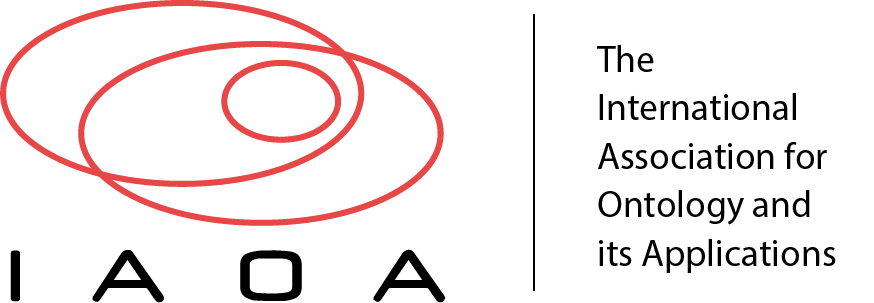Definition and scope
The FOIS conference is a meeting point for all researchers with an interest in formal ontology. Formal ontology is the systematic study of the types of entities and relations making up the domains of interest represented in modern information systems. The conference encourages new high quality submissions on both theoretical issues and practical advancements: FOIS 2021 will have distinct tracks for foundational issues, ontology applications and domain ontologies.
FOIS aims to be a nexus of interdisciplinary research and communication, inclusive of researchers from many domains engaging with formal ontology. Common application areas include conceptual modeling, database design, knowledge engineering and management, software engineering, organizational modeling, artificial intelligence, robotics, computational
linguistics, the life sciences, bioinformatics and scientific research in general, geographic information science, information retrieval, library and information science, as well as the Semantic Web.
FOIS is the flagship conference of the International Association for Ontology and its Applications (IAOA: http://iaoa.org/), which is a non-profit organization promoting interdisciplinary research and international collaboration in formal ontology.
Important dates
- Paper submission deadline: 22 April 2021
- Notifications: 25 June 2021
- Camera-ready papers: 19 July 2021
- Conference dates: 13-16 September 2021
Location
FOIS 2021 is planned as a hybrid event: there will be a physical meeting in Bozen-Bolzano, Italy, with a remote participation option.
Submissions
FOIS seeks full-length high-quality papers on a wide range of topics. Each submission needs to submitted as part of one of the tracks, i.e., Foundational, Application, and Domain Ontology.
(1) Foundational papers address content-related ontological issues, their formal representation, and their relevance to some aspect of information systems.
(2) Application papers address novel methods and systems related to building, evaluating, or using ontologies, emphasizing the impact of ontology contents on the application.
(3) Domain ontology papers describe a novel ontology for a specific realm of interest, clarifying ontological choices against requirements and foundational theory, and showing ontology use.
While different review criteria are applied to these tracks, the same formatting requirements apply to all papers:
- Submitted papers must not exceed 14 pages (including bibliography).
- They must include an abstract of no more than 300 words.
- Papers should be submitted non-anonymously in PDF format following IOS Press formatting guidelines, which may be found at the following link: https://www.iospress.nl/service/authors/latex-and-word-tools-for-book-authors/.
- Papers must be submitted via Easychair. Submission link will be up later.
Authors are limited to a maximum of two first-authored submissions, with no limit to the number of co-authored submissions, and a maximum of two presentations of accepted papers by any individual.
Reviews will be anonymous. The submission process will include a rebuttal phase. More detailed information will be published on the FOIS 2021 Web page in due time.
Topics of interest
Areas of particular interest to FOIS include the following:
Foundational Issues:
- Kinds of entities: particulars/universals, continuants/occurrents, abstracta/concreta, dependent entities/independent entities, natural objects/artifacts
- Formal relations: parthood, identity, connection, dependence, constitution, causality, subsumption, instantiation
- Vagueness and granularity
- Space, time, and change
Methodological issues
- Top-level vs. domain-specific ontologies
- Role of reference ontologies
- Ontology similarity, integration and alignment
- Ontology modularity, contextuality, and evolution
- Formal comparison among ontologies
- Relationship with cognition, language, semantics, context
- Ontologies and Knowledge Graphs
Domain-specific ontologies
- Ontology of physical reality (matter, space, time, motion etc.)
- Ontology of biological reality (organisms, genes, proteins, cells etc.)
- Ontology of mental reality and agency (beliefs, intentions, emotions, perceptions, cognition, etc.)
- Ontology of artifacts, functions, capacities and roles
- Ontology of social reality (institutions, organizations, norms, social relationships, artistic expressions etc.)
Applications:
- Ontology-driven information systems design
- Ontological foundations for conceptual modeling
- Knowledge management
- Qualitative modeling
- Computational linguistics
- Information retrieval
- Semantic Web
- Business modeling
- Ontologies and Machine Learning
- Ontologies and Explainable AI
- Ontologies for particular scientific disciplines (biology, chemistry, geography, physics, geoscience, cognitive sciences, linguistics etc.)
- Ontologies for engineering: shape, form and function, artifacts, manufacturing, design, architecture etc.
- Ontologies for the humanities: arts, cultural studies, history, literature, philosophy, etc.
- Ontologies for the social sciences: economics, law, political science, anthropology, archeology, etc.

